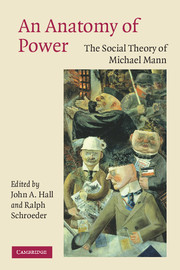Book contents
- Frontmatter
- Contents
- List of figures
- List of contributors
- 1 Introduction: the IEMP model and its critics
- Part I Theory, practice, method
- Part II Types of power
- 6 Mann's theory of ideological power: sources, applications and elaborations
- 7 Political power un-manned: a defence of the Holy Trinity from Mann's military attack
- 8 Mann, the state and war
- 9 Infrastructural power, economic transformation, and globalization
- Part III European exceptionalism?
- Part IV Promise and perils of modernity
- Part V Response
- Bibliography of Michael Mann's Writings
- Index
- References
9 - Infrastructural power, economic transformation, and globalization
Published online by Cambridge University Press: 22 September 2009
- Frontmatter
- Contents
- List of figures
- List of contributors
- 1 Introduction: the IEMP model and its critics
- Part I Theory, practice, method
- Part II Types of power
- 6 Mann's theory of ideological power: sources, applications and elaborations
- 7 Political power un-manned: a defence of the Holy Trinity from Mann's military attack
- 8 Mann, the state and war
- 9 Infrastructural power, economic transformation, and globalization
- Part III European exceptionalism?
- Part IV Promise and perils of modernity
- Part V Response
- Bibliography of Michael Mann's Writings
- Index
- References
Summary
This chapter attempts two things. One is to show how Mann's theory of state power continues to generate new insights that advance the debates on state capacity, economic transformation, and globalization. The other is to suggest how these insights are at odds with some aspects of Mann's recent work on globalization.
Mann's theoretical and historical work on state power, as even the most cursory survey would reveal, has influenced scholars young and old across the social science disciplines. His theory of state power and the distinction between infrastructural and despotic power have offered particularly fertile soil for scholars of comparative politics and political economy. Many scholars of comparative politics have applied his concepts to explain failed or weak states in the developing world (e.g. Lucas 1998; Centeno 1997), to account for developmental blockages or breakthroughs in transition economies (Stoner-Weiss 2002; Zhu 2002), to revise conventional explanations for the rise of the West (Hall 1985), and to explain why some states, whether European or Asian, have been more effective than others at economic development (Weiss and Hobson 1995). In recent years, young sociologists have also sought to extend Mann's idea of the modern state's infrastructural power (IP) to symbolic and social infrastructures (e.g. Loveman). As the range of applications attests, Mann's theoretical and conceptual innovations continue to bear fruit.
Infrastructural power and economic transformation
In general, Mann's theory of state power has been most fruitfully applied to explain broad historical differences in types of state and contrasts in state autonomy.
- Type
- Chapter
- Information
- An Anatomy of PowerThe Social Theory of Michael Mann, pp. 167 - 186Publisher: Cambridge University PressPrint publication year: 2006
References
- 28
- Cited by

